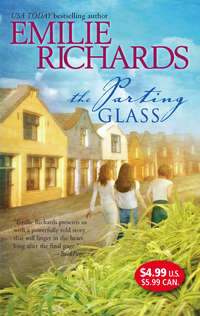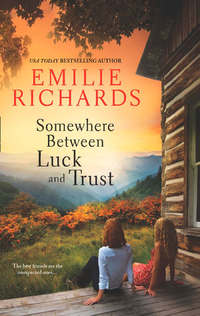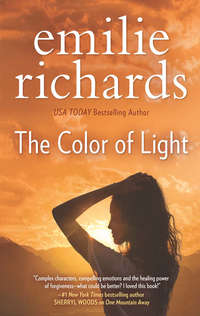
Полная версия
Rising Tides

EMILIE RICHARDS
Rising Tides

For Maureen Moran, with thanks for her support.
Dear Reader,
I was delighted to learn that Iron Lace and the sequel, Rising Tides, would be re-released in trade paperback this year. The novels were originally published more than a decade ago, and since that time I’ve had many letters asking where they could be purchased. I’m happy to say these new editions will appeal to readers who didn’t find them the first time, as well as readers who did, but would like new copies to replenish their libraries.
Iron Lace and Rising Tides were written before Hurricane Katrina destroyed so much of the Crescent City, including the house where I lived when I was researching the stories. The two novels are set between historic hurricanes, an unnamed one at the end of the nineteenth century, and Hurricane Betsy in 1965. The research was thought provoking. It was also preparation for what was to come, although I was no longer living there to watch Katrina up close. Like the rest of the country, I grieved, but unlike many I was not surprised.
Louisiana is a unique state with a unique identity. I like to think of these books as literary gumbo, exploring the myriad of people, cultures and attitudes that have made it what it is. Once you’ve lived there, no matter where you go, a part of you will always call Louisiana home.

CONTENTS
PROLOGUE
CHAPTER ONE
CHAPTER TWO
CHAPTER THREE
CHAPTER FOUR
CHAPTER FIVE
CHAPTER SIX
CHAPTER SEVEN
CHAPTER EIGHT
CHAPTER NINE
CHAPTER TEN
CHAPTER ELEVEN
CHAPTER TWELVE
CHAPTER THIRTEEN
CHAPTER FOURTEEN
CHAPTER FIFTEEN
CHAPTER SIXTEEN
CHAPTER SEVENTEEN
CHAPTER EIGHTEEN
CHAPTER NINETEEN
CHAPTER TWENTY
CHAPTER TWENTY-ONE
CHAPTER TWENTY-TWO
CHAPTER TWENTY-THREE
CHAPTER TWENTY-FOUR
CHAPTER TWENTY-FIVE
CHAPTER TWENTY-SIX
CHAPTER TWENTY-SEVEN
CHAPTER TWENTY-EIGHT
CHAPTER TWENTY-NINE
CHAPTER THIRTY
CHAPTER THIRTY-ONE
EPILOGUE
LETTER TO READER
PROLOGUE
New Orleans, 1965
Dried rose petals, vetiver and death. The three scents pooled in the sultry May air until there was no escape from them. After her first waking breath, Aurore was frightened to take another. More disturbing still was the knowledge that, once again, she had dreamed of Rafe.
As always, he had come to her when she least expected him. Others sometimes came, apparitions who stalked her dreams and the lucid moments when she dared to count the days left to her. But it was only Rafe who came when she was sleeping soundly, Rafe who gathered the events of her life like wildflowers in a summer meadow and presented them back to her.
She forced herself to breathe, but as she did, the air seemed to grow more oppressive. She had forbidden her household staff to turn on the air-conditioning in this wing of the house, and the ceiling fans whirring above her mixed warm air with warmer. Someone had closed her windows as she napped, afraid, she supposed, that she would awaken if a mockingbird shrieked a crow’s call from the branch of a magnolia. Her staff didn’t understand that each waking moment was a lagniappe, an unexpected gift appreciated only by the old.
She was old. She had denied the truth for years, convinced at sixty that activity was an antidote for aging, convinced at seventy that she could ignore death as she had sometimes ignored the other unpleasant realities of life. Now she was seventy-seven, and death wasn’t going to ignore her. Death had loomed beside her bed for weeks, ready to pounce if her will faltered. Had there been one such moment, she knew, she would be gone already, and she hadn’t been ready to die. Not then. Not with stories waiting to be told, secrets waiting to be revealed.
She had almost waited too long. Years ago she could have called her family together, summoned them like an imperious matriarch and forced them to listen to an old woman’s tales. They wouldn’t have dared disobey her summons.
But she had waited. Now, with death waiting to claim her, she knew she could wait no longer. She opened her eyes and saw that the room was growing dark. Twilight had always seemed like God’s indrawn breath, a pause in the progression of time. But there was no time to pause now. Never again.
Something rustled at her bedside, the unmistakable crackle of a starched white uniform. She turned her head and saw that the woman standing there was the gentlest of the nurse-companions who charted the ebb tide of her life. Aurore struggled to form words. “Has Spencer arrived?”
“Yes, Mrs. Gerritsen.”
To Aurore, her own voice seemed a profane rasp in the stillness, but she was pleased it was audible. “How long?”
“He’s been here nearly an hour. I told him you’d want me to wake you, but he wouldn’t let me.”
“He protects me.” She moistened her lips with her tongue. “He always has.”
“Would you like some water?”
Aurore nodded. She could feel the head of the bed lifting as the young woman cranked. “Just a sip. Then…Spencer.”
“Are you sure you feel well enough?”
“If I waited until I felt better…I’d never see him.”
The nurse made sympathetic noises low in her throat as she poured water from a pitcher, then lifted a glass to Aurore’s lips. The water trickled in, drop by drop, until Aurore signaled that she was finished.
“Do you want anything else before I get Mr. St. Amant?”
“The windows. I don’t want them…closed again. Never again.”
“I’ll open the French doors, too.”
Aurore listened as the rustle circled her bed. She heard the slide of windows, and then, from outside, the chirping hum of the year’s first cicadas. The air that drifted in was damp against her skin, primeval in its rain-forest scent and sensation. For a moment she was seventeen, standing on the bank of the Mississippi River, and river mist was rising to envelop her. She was leaning forward, watching barge and steamer make their way against the current. She was leaning forward, waiting for life to begin.
“Aurore…”
Aurore turned her head and gazed at the man who had been her attorney for nearly fifty years.
“How are you, dear?” Spencer asked.
“Old. Sorry I am.”
Spencer slowly lowered himself to the chair the nurse had placed at the bedside. “Are you really sorry? I re member when you were young, you know.”
“You remember too much.”
“Sometimes I think so.” He took her hand. His was dry and trembling, yet still strong enough to enfold hers.
Her mind drifted again, as it sometimes did now. She remembered a day so many years before, at Spencer’s office on Canal Street. The office was still there, despite Spencer’s being well past the age of retirement. She didn’t know why he hadn’t passed on his practice to one of his younger partners, but she was glad, so glad, he hadn’t.
“You were elegant,” she said. “Compassionate. I still thought…you would turn me away.”
“The first day you came to see me?” He laughed a little. “You were so pale, and you wore a hat that cast a shadow across your forehead. I thought you were lovely.”
“But…you couldn’t have liked what you heard.”
“It wasn’t my place to like or not like what you told me. I promised you I would never betray a word of what passed between us. You played with a long strand of amber and jet beads while we talked.”
“Amber and jet.” She smiled. “I don’t remember.”
“The beads passed between your fingers, one by one, like a rosary. There was time for a hundred pleas for intercession before you left my office.”
She lifted her gaze to his. “I’ve learned since that no one…will intercede for me.”
His hand tightened around hers. “Then you’ve learned more than most people ever do, my dear.”
“I want you to file the new will. Just as we wrote it. I want…the old will destroyed.”
Seconds passed by. “You’ve thought this over care fully?”
“It is all…I’ve thought about.”
“Things may not turn out as you wish. More harm than good could result. At the very least, people you love could be hurt.”
“My whole life…I’ve been afraid to tell the truth.”
“And you’re not afraid now?”
“I’m more afraid.” He sat forward, cradling her hand in his lap, but she continued before he could speak. “But even more afraid…the truth will never be told. Others must have the chance to be courageous now…as I never was.”
“This is an act of courage.”
Her mind drifted to two men she had loved. Rafe. And her son, Hugh. Two men who had known what courage was. “No. Not an act of courage,” she said. “The last, desperate act of a coward.”
Twilight deepened into night as they sat together. Finally he spoke again. “Shall I come back tomorrow to see if you’ve changed your mind?”
“No. Will you do this for me, Spencer? Just as we talked about? You’ll go down…to Grand Isle?”
“I’ll do whatever you wish.” He paused. “I always have.”
“No one ever had a better friend.”
“Yes. We’ve been friends.” He lifted her hand to his lips and kissed it. Then, gently, he placed it at her side. “I have an address for Dawn. She’s in England, taking photographs for a magazine in New York. I could ask her to come home.”
For a moment, Aurore was tempted to say yes. Just to see Dawn, to have her beside her bed, to touch her one last time. Then to be forced to reveal everything to her granddaughter, much as Dawn had once revealed childhood secrets to her.
Everything.
Aurore couldn’t bear the thought. She really was the coward she had claimed to be. “No. It’s best she not come home until…”
“I understand.”
“There’s only so much I have the strength to do.”
Spencer rose. “Then I’ll send her your letter and send the others theirs…when I must.”
“Yes. The letters.” She thought of the letters, which she had dictated herself. And all the lives that they would change.
“You’re tired. And you still have another visitor.”
Aurore didn’t ask who the visitor was. She was certain from the sound of Spencer’s voice that it was some one she would be glad to see.
Aurore knew when Spencer left the room, although her eyes were closed by then. The cicadas’ song grew louder, and she could picture the insects’ hard-shelled, alien bodies sailing from limb to limb of the moss-covered live oaks bordering her Garden District yard. With the windows open, the evening air was redolent of the last of the sweet olives and the first of the magnolias, and it masked the fragrances of an old woman’s life and impending death.
She heard footsteps, but she didn’t have the strength to open her eyes once more. A hand took hers, a firm, strong hand. She felt lips, warm against her cheek.
“Phillip,” she whispered.
“You don’t have to talk, Aurore. I’ll stay for a while anyway. Just rest now.”
The voice was Phillip’s, but for a moment it was Rafe by Aurore’s side. In that instant, she was no longer old, but young once more. Her life was ahead of her, her decisions were not yet made. As she drifted toward dreams, the cicadas’ song became one dearer and more familiar. Phillip was humming one of the songs his mother had made famous when Aurore fell asleep.
CHAPTER ONE
September 1965
The young man Dawn Gerritsen picked up just outside New Orleans looked like a bum, but so did a lot of students hitchhiking the world that summer. His hair wasn’t clean; his clothes were a marriage of beat poet and circus performer. To his credit, he had neither the pasty complexion of a Beatles-mad Liverpudlian nor the California tan of a Beach Boy surfer. In the past year she had seen more than enough of both types making the grand tour of rock bands and European waves.
The hitchhiker’s skin was freckled, and his eyes were pure Tupelo honey. Biloxi and Gulfport oozed from his throat, and the first time he called her ma’am, she wanted to drag him to a sun-dappled levee and make him moan it over and over until she knew, really knew, that she was back in the Deep South again.
She hadn’t dragged him anywhere. She didn’t even remember his name. She was too preoccupied for sex, and she wasn’t looking for intimacy. After three formative years in Berkeley, she had given up on love, right along with patriotism, religion and happily-ever-afters. Her virginity had been an early casualty, a prize oddly devalued in California, like an ancient currency exchanged exclusively by collectors.
Luckily her hitchhiker didn’t seem to be looking for intimacy, either. He seemed more interested in the food in her glove compartment and the needle on her speedometer. After her initial rush of sentiment, she almost forgot he was in the car until she arrived in Cut Off. Then she made the mistake of reaching past him to turn up the radio. It was twenty-five till the hour, and the news was just ending.
“And in other developments today, State Senator Ferris Lee Gerritsen, spokesman for Gulf Coast Shipping, the international corporation based in New Orleans, announced that the company will turn over a portion of its land holdings along the river to the city so that a park can be developed as a memorial to his parents, Henry and Aurore Gerritsen. Mrs. Gerritsen, granddaughter of the founder of Gulf Coast Shipping, passed away last week. Senator Gerritsen is the only living child of the couple. His brother, Father Hugh Gerritsen, was killed last summer in a civil-rights incident in Bonne Chance. It’s widely predicted that the senator will run for governor in 1968.”
Although the sun was sinking toward the horizon, Dawn retrieved her sunglasses from the dashboard and slipped them on, first blowing her heavy bangs out of her eyes in her own version of a sigh. As she settled back against her seat, she felt the warmth of a hand against her bare thigh. One quick glance and she saw that her hitchhiker was assessing her with the same look he had, until that moment, saved for her Moon Pies and Twinkies. Dawn knew what he saw. A long-limbed woman with artfully outlined blue eyes and an expression that refuted every refined feature that went with them. Also a possible fortune.
He smiled, and his hand inched higher. “Your name’s Gerritsen, didn’t you say? You related to him?”
“You’re wasting your time,” she said.
“I’m not busy doing anything else.”
She pulled over to the side of the road. A light rain was falling and a harder one was forecast, but that didn’t change her mind. “Time to stick out your thumb again.”
“Hey, come on. I can make the rest of the trip more fun than you can imagine.”
“Sorry, but my imagination’s bigger than anything you’ve got.”
Drawling curses, he reclaimed his hand and his duffel bag. She pulled back onto the road after the door slammed shut behind him.
She was no lonelier than she had been before, but after the news, and without the distraction of another person in the next seat, Dawn found herself thinking about her grandmother, exactly the thing she had tried to avoid by picking up the hitchhiker in the first place. This trip to Grand Isle had nothing to do with pleasure and everything to do with Aurore Le Danois Gerritsen. On her deathbed, Aurore had decreed that her last will and testament be read at a gathering at the family summer cottage. And the reading of the will was a command performance.
The last time Dawn drove the route between New Orleans and Grand Isle, she’d only had her license for a year. South Louisiana was a constant negotiation between water and earth, and sometimes the final decision wasn’t clear. She had flown over the land and crawled over the water. Her grandmother had sat beside her, never once pointing out that one of the myriad draw bridges might flip them into murky Bayou Lafourche or that some of the tiny towns along the way fed their coffers with speed traps. She had chatted of this and that, and only later, when Aurore limped up the walk to the cottage, had Dawn realized that her right leg was stiff from flooring nonexistent gas and brake pedals.
The memory brought an unexpected lump to her throat. The news of her grandmother’s death hadn’t surprised her, but neither had she truly been prepared. How could she have known that a large chunk of her own identity would disappear when Aurore died? Aurore Gerritsen had held parts of Dawn’s life in her hands and sculpted them with the genius of a Donatello.
Some part of Dawn had disappeared at her uncle’s death, too. The radio report had only touched on Hugh Gerritsen’s death, as if it were old news now. But it wasn’t just old news to her. Her uncle had been a controversial figure in Louisiana, a man who practiced all the virtues that organized religion espoused. But to her he had been Uncle Hugh, the man who had seen everything that was good inside her and taught her to see the same.
Two deaths in two years. The only Gerritsens who had ever understood her were gone now. And who was left? Who would love her simply because she was Dawn, without judgment or emotional bribery? She turned up the radio again and forced herself to sing along with Smokey Robinson and the Miracles.
An hour later she crossed the final bridge. Time ticked fifty seconds to the minute on the Gulf Coast. Grand Isle looked much as it had that day years before when she had temporarily crippled her grandmother. Little changed on the island unless forced by the hand of Mother Nature. The surf devoured and regurgitated the shoreline, winds uprooted trees and sent roofs spinning, but the people and their customs stayed much the same.
The island was by no means fashionable, but every summer Dawn had joined Aurore here, where the air wasn’t mountain-fresh and the sand wasn’t cane-sugar perfection. And every summer Aurore had patiently patched and rewoven the intricate fabric of Gerritsen family life.
Today there was wind, and the surf was angry, al though that hadn’t discouraged the hard-core anglers strung along the shoreline. A hurricane with the friendly name of Betsy hovered off Florida, and although no body really expected her to turn toward this part of Louisiana, if she did, the island residents would protect their homes, pack their cars and choose their retreats be fore the evacuation announcement had ended.
Halfway across the length of Grand Isle, Dawn turned away from the gulf. A new load of oyster shells had been dumped on the road to the Gerritsen cottage, but it still showed fresh tire tracks. The cottage itself was like the island. Over the years, Mother Nature had subtly altered it, but the changes had only intensified its basic nature. Built of weathered cypress in the traditional Creole style and surrounded by tangles of oleander, jasmine and myrtle, it was as much a part of the landscape as the gnarled water oaks encircling it. Even the addition, de signed by her grandmother, seemed to have been there forever.
Dawn wondered if her parents had already arrived. She hadn’t called them from London or the New Or leans airport, sure that if she did they would expect her to travel to Grand Isle with them. She had wanted this time to adjust slowly to returning to Louisiana. She was twenty-three now, too old to be swallowed by her family and everything they stood for, but she had needed these extra hours to fortify herself.
As she pulled up in front of the house she saw that a car was parked under one of the trees, a tan Karmann Ghia with a California license plate. She wondered who had come so far for the reading of her grandmother’s will. Was there a Gerritsen, a Le Danois three times re moved, who had always waited in the wings?
She parked her rented Pontiac beside the little convertible and pulled on her vinyl slicker and brimmed John Lennon cap to investigate. The top was up, but she peered through one of the rain-fogged windows. The car belonged to a man. The sunglasses on the dashboard looked like an aviator’s goggles; a wide-figured tie was draped over a briefcase in the rear.
She wrapped her slicker tighter around her. Mary Quant had designed it as protection against London’s soft, cool rain. Now it trapped the Louisiana summer heat and melted against Dawn’s thighs, but she didn’t care. Her gaze had moved beyond the car, beyond the oleander and jasmine, to the wide front gallery. A man she had never expected to see again leaned against a square pillar and watched her.
She was aware of rain splashing against the brim of her hat and running in streams across her boots, but she didn’t move. She stood silently and wondered if she had ever really known her grandmother.
Ben Townsend stepped off the porch. He had no protection, Carnaby-mod or otherwise. The rain dampened his oxford-cloth shirt and dark slacks and turned his sun-streaked hair the color of antique brass. His clothes clung to a body that hadn’t changed in the past year. Her eyes measured the span of his shoulders, the width of his waist and hips, the long stretch of his legs. Her expression didn’t change as he approached. Repressing emotion was a skill she had cultivated since she saw him last.
“I guess you didn’t expect me.” He stopped a short distance from her, as if he had calculated to the inch exactly how close she would allow him to come.
“A masterpiece of understatement.”
“I got a letter asking me to come for the reading of your grandmother’s will.” He shoved his hands in his pockets. Dawn had seen him stand that way so many times, shoulders hunched, palms turned out, heels set firmly in the ground. The stance made him real, not a shadow from her memories.
“I’m surprised you bothered.” She rocked back on her heels, too, as if she were comfortable enough to stand under the dripping oak forever. “Expecting to find a story here?”
“Nope. I’m an editor now. I buy what other people write.”
For the past year, Ben had worked for Mother Lode, a celebrated new magazine carving out its niche among California’s liberal elite. Dawn had read just one issue. Mother Lode obviously prized creativity, intellect and West Coast self-righteousness. She wasn’t surprised Ben had moved quickly up its career ladder.
“You always were good at pronouncing judgment,” she said.
He hunched his shoulders another inch. “And you seem to have gotten better at it.”
“I’ve gotten better at lots of things, but apparently not at understanding Grandmère. I can’t figure if inviting you was an attempt to force a lovers’ reunion, or if she just had a twisted sense of humor.”
“Do you really think your grandmother asked me here to hurt you?”
“You have another explanation?”
“Maybe it has something to do with Father Hugh.”
She tossed back her hair. “I don’t know why it should. Uncle Hugh’s been dead a year.”
“I know when he died, Dawn. I was there.”
“That’s right. And I wasn’t. I think that was the subject of our last conversation.”
That conversation had taken place a year before, but now Dawn remembered it as if Ben’s words were still carving catacombs under her feet. She had been standing beside Ben’s hospital bed on the afternoon after her uncle’s death. A nurse had come at the sound of raised voices, then scurried away without saying a word. Dawn could still remember the smell of lilies from an arrangement on another patient’s bedside table and the tasteless Martian green of gladiola sprays. Ben had shouted questions and waited for answers that never came.







